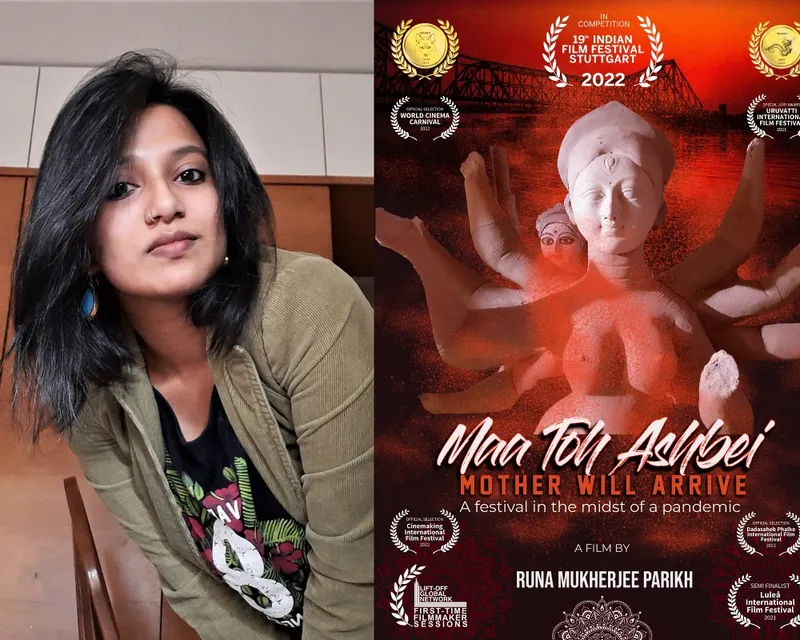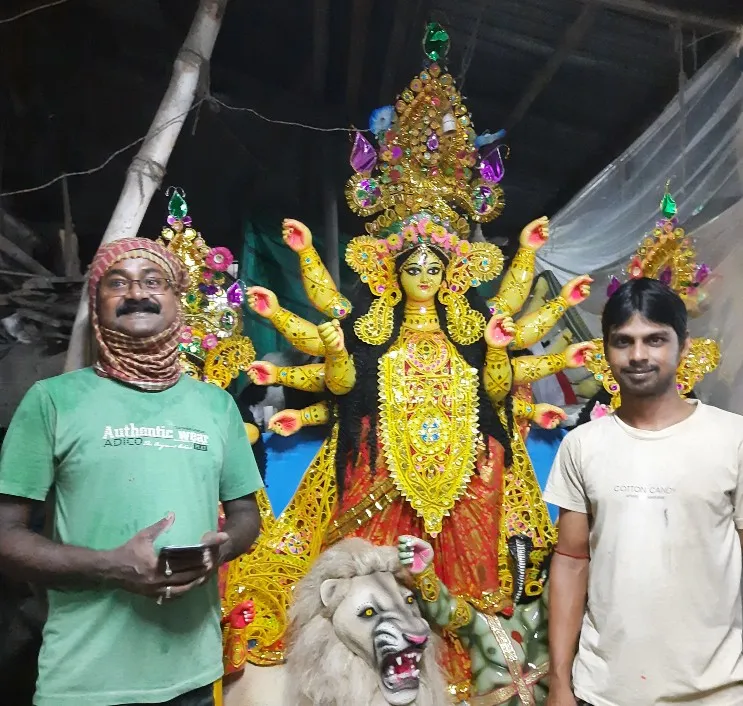This filmmaker’s moving tribute to Kolkata’s idol makers has won global accolades
Runa Mukherjee Parikh is an independent journalist turned documentary filmmaker. Her film 'Mother will Arrive' was selected for the 13th Indian Film Festival of Melbourne and nominated for the German Star of India award at the 19th Indian Film Festival Stuttgart.
Come July-August, potters and idol makers in North Kolkata’s bustling Kumartuli and Nimta areas start giving shape and colour to Durga idols, prepping them for the state’s biggest festival, Pujo. It’s a familiar sight every year, and resident Bengalis and tourists alike are enamoured by the run-up to the Pujo celebrations, as much as the festival itself in October.
However, in 2020, everything related to Pujo seemed to come to a standstill, much like the other things around the world. The idol makers bore the brunt of COVID-19 and Cyclone Ampan.
Documentary filmmaker Runa Mukherjee Parikh made a movie on the idol makers, whose struggles made international news. Titled Maa toh Ashbei (Mother will Arrive), the movie found a mention at the 13th Indian Film Festival of Melbourne this year and was most recently nominated for the German Star of India award at the 19th Indian Film Festival Stuttgart, along with gems like Writing with Fire.
In a free-flowing conversation with HerStory, Runa talks about how she thought of the idea for Maa toh Ashbei and what inspired her to make a movie on the famed idol makers.
Rewind to 2020, when the first lockdown was lifted in June-July. Ahmedabad-based Runa Mukherjee Parikh, then an independent journalist, who had just had her second baby, decided to travel to her hometown Kolkata. Expecting the familiar buzz of the festival season when she landed, Runa was shocked to see that many of the kumors or idol makers were just sitting around aimlessly.
“I had never seen anything like this in all my years in Kolkata. I instinctively thought of my childhood, there was so much fascination. This was completely the opposite of what I used to see every year. From the time I went back home, I felt this strong urge to document this and cover this, of course only if the idol-makers would let me,” recalls the filmmaker.
Runa started visiting the potters and idol makers every other day and conversing with them. She engaged with them in everyday conversations, which she captured on video on her smartphone.
The filmmaker says, “They didn’t have much to speak and only seemed to be lamenting that there were no customers. They would see me and say, ‘Nobody else is coming By now, we should have had plenty of large orders, but even the small orders are missing.’”
After several weeks, Runa had enough footage and she decided it was time to make it into something meaningful.

Filmmaker Runa Mukherjee Parikh's (left) documentary Maa toh Ashbei's (Mother will Arrive) poster (right) for the 19th Indian Film Festival Stuttgart
Real to reel
Shot from August to November, capturing even the 10-day festival of Pujo, the documentary is a beautiful portrayal of how the idol makers went from despair to hope. While over 90% of the footage was caught on phone, a few still photographs were captured on a DSLR camera.
Interestingly, the Bengali title of the documentary Maa toh Ashbei has both an allegorical meaning and a literal one. It says the mother goddess will arrive, no matter what. “It is an ode to our mothers, of how they beat tremendous odds. The title is also a note of optimism in these dark times,” explains Runa, who is also the scriptwriter and the producer of the small-budget film.
Runa was featured as one the top-five women filmmakers in India at the recently held Kalakari Film Fest in Madhya Pradesh.
The filmmaker says she was certain she wanted to capture the anxiety and uncertainty of that time in the movie, when COVID-19 was still largely unknown and nobody had any foresight on how things would unravel.
The background score, ‘Durga’s Theme’, is both moving and uplifting and was created by Ahmedabad-based music composer Avdhesh Babaria, who listened to various Bengali folk music styles and instruments like the iktara to create the piece.
At a time when social distancing and isolation were followed stringently, Runa says filming on the streets was quite challenging. “Throughout the period of filming, we would be wearing our masks. A lot of what was being said would get muffled. On some days, the idol makers and I would have a cup of tea together, and when we’d remove our masks to do so, there’d be an awkward silence or an unspoken worry of the virus passing between us.”

Award-winning idol maker Mala Pal, who talks to Runa in the documentary.
A moving tribute
(The filmmaker had shared a private screener link for the writer to view the movie.)
Runa’s approach, throughout the film, is personal and intimate. For instance, the scene that introduces the woman idol maker Mala Pal is poignant. Mala is busy painting a beautiful swan while narrating how she won the fight against patriarchy in idol making, as early as 1985, by insisting on learning the trade.
With a run-time of 30 minutes, Mother will Arrive captures the attention of the audience with live sounds and scenes from the idol makers’ homes. The scene portraying the manner in which the idol makers prepare to welcome Goddess Kali during Diwali, three weeks after Pujo, is also fascinating.

Idol maker Sanjay Pal and his assistant with their creation
Post-production
By September 2021, Runa had started submitting Mother will Arrive to film festivals.
“At the Indian Film Festival Stuttgart, when it was nominated along with Writing with Fire, I was over the moon,” she says.
As the movie does the rounds across a few more film festivals, Runa is hopeful she will find a distributor. “As the world steadily moves out of this pandemic, the documentary will always be a reminder of things and of hope during a crisis,” she notes.
What's next?
When asked about her next subject, Runa says she only has a vague idea as of now, but she intends to capture the sentiments behind one of the largest holy events for Jains—Paryushana.
“Jainism has a thriving community of its own, and, although a minority, they take their practices, their culture, and their religion very seriously. As an outsider, I’m intrigued and want to do something around that,” concludes Runa.
Edited by Swetha Kannan








